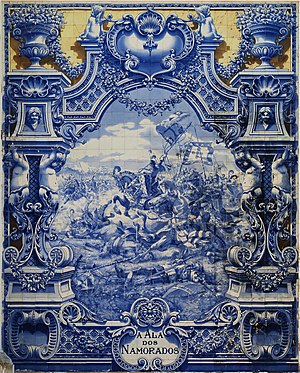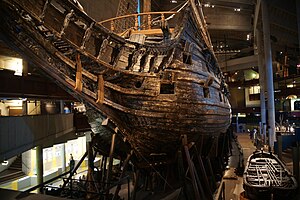Portal:Europe
Wikipedia portal for content related to Europe / From Wikipedia, the free encyclopedia
Portal maintenance status: (February 2020)
|
| Main | Geography | Projects |
|
|
Europe is a continent located entirely in the Northern Hemisphere and mostly in the Eastern Hemisphere. It comprises the westernmost peninsulas of the continental landmass of Eurasia, and is bordered by the Arctic Ocean to the north, the Atlantic Ocean to the west, the Mediterranean Sea to the south, and Asia to the east. Europe is commonly considered to be separated from Asia by the watershed of the Ural Mountains, the Ural River, the Caspian Sea, the Greater Caucasus, the Black Sea, and the waterways of the Turkish Straits. Although much of this border is over land, Europe is generally accorded the status of a full continent because of its great physical size and the weight of history and tradition.
Europe covers about 10,180,000 km2 (3,930,000 sq mi), or 2% of the Earth's surface (6.8% of land area), making it the second smallest continent (using the seven-continent model). Politically, Europe is divided into about fifty sovereign states, of which Russia is the largest and most populous, spanning 39% of the continent and comprising 15% of its population. Europe had a total population of about 741 million (about 11% of the world population), as of 2018. The European climate is largely affected by warm Atlantic currents that temper winters and summers on much of the continent, even at latitudes along which the climate in Asia and North America is severe. Further from the sea, seasonal differences are more noticeable than close to the coast.
The history of Europe concerns itself with the discovery and collection, the study, organization and presentation and the interpretation of past events and affairs of the people of Europe since the beginning of written records. During the Neolithic era and the time of the Indo-European migrations, Europe saw human inflows from east and southeast and subsequent important cultural and material exchange. The period known as classical antiquity began with the emergence of the city-states of ancient Greece. Later, the Roman Empire came to dominate the entire Mediterranean basin. The fall of the Roman Empire in AD 476 traditionally marks the start of the Middle Ages. Beginning in the 14th century a Renaissance of knowledge challenged traditional doctrines in science and theology. Simultaneously, the Protestant Reformation set up Protestant churches primarily in Germany, Scandinavia and England. After 1800, the Industrial Revolution brought prosperity to Britain and Western Europe. The main European powers set up colonies in most of the Americas and Africa, and parts of Asia. In the 20th century, World War I and World War II resulted in massive numbers of deaths. The Cold War dominated European geo-politics from 1947 to 1989. After the fall of the Iron Curtain, the European countries grew together.
The culture of Europe is rooted in the art, architecture, film, different types of music, economic, literature, and philosophy that originated from the continent of Europe. European culture is largely rooted in what is often referred to as its "common cultural heritage".
The economy of Europe comprises more than 744 million people in 50 countries. The formation of the European Union (EU) and in 1999, the introduction of a unified currency, the Euro, brings participating European countries closer through the convenience of a shared currency and has led to a stronger European cash flow. The difference in wealth across Europe can be seen roughly in former Cold War divide, with some countries breaching the divide (Greece, Estonia, Portugal, Slovenia and the Czech Republic). Whilst most European states have a GDP per capita higher than the world's average and are very highly developed (Liechtenstein, Luxembourg, Monaco, Andorra, Norway, Sweden, Denmark, Netherlands, Switzerland, United Kingdom, Ireland, Germany), some European economies, despite their position over the world's average in the Human Development Index, are poorer.
Featured article - show another
Vasa or Wasa (Swedish pronunciation: [²vɑːsa] ⓘ) is a Swedish warship built between 1626 and 1628. The ship sank after sailing roughly 1,300 m (1,400 yd) into her maiden voyage on 10 August 1628. She fell into obscurity after most of her valuable bronze cannons were salvaged in the 17th century, until she was located again in the late 1950s in a busy shipping area in Stockholm harbor. The ship was salvaged with a largely intact hull in 1961. She was housed in a temporary museum called Wasavarvet ("The Vasa Shipyard") until 1988 and then moved permanently to the Vasa Museum in the Royal National City Park in Stockholm. The ship is one of Sweden's most popular tourist attractions and has been seen by over 35 million visitors since 1961. Since her recovery, Vasa has become a widely recognized symbol of the Swedish Empire.
The ship was built on the orders of the King of Sweden Gustavus Adolphus as part of the military expansion he initiated in a war with Poland-Lithuania (1621–1629). She was constructed at the navy yard in Stockholm under a contract with private entrepreneurs in 1626–1627 and armed primarily with bronze cannons cast in Stockholm specifically for the ship. Richly decorated as a symbol of the king's ambitions for Sweden and himself, upon completion she was one of the most powerfully armed vessels in the world. However, Vasa was dangerously unstable, with too much weight in the upper structure of the hull. Despite this lack of stability, she was ordered to sea and foundered only a few minutes after encountering a wind stronger than a breeze. (Full article...)Featured location - show another
Surtsey ("Surtr's island" in Icelandic, Icelandic pronunciation: [ˈsʏr̥(t)sˌeiː] ⓘ) is an uninhabited volcanic island located in the Vestmannaeyjar archipelago off the southern coast of Iceland. At Surtsey is the southernmost point of Iceland. It was formed in a volcanic eruption which began 130 metres (430 feet) below sea level, and reached the surface on 14 November 1963. The eruption lasted until 5 June 1967, when the island reached its maximum size of 2.7 km2 (1.0 sq mi). Since then, wave erosion has caused the island to steadily diminish in size: , its surface area was 1.3 km2 (0.50 sq mi). The most recent survey (2007) shows the island's maximum elevation at 155 m (509 ft) above sea level.
The new island was named after Surtr, a fire jötunn or giant from Norse mythology. It was intensively studied by volcanologists during its eruption, and afterwards by botanists and other biologists as life forms gradually colonised the originally barren island. The undersea vents that produced Surtsey are part of the Vestmannaeyjar submarine volcanic system, part of the fissure of the sea floor called the Mid-Atlantic Ridge. Vestmannaeyjar also produced the famous eruption of Eldfell on the island of Heimaey in 1973. The eruption that created Surtsey also created a few other small islands along this volcanic chain, such as Jólnir and other, unnamed peaks. Most of these eroded away fairly quickly. It is estimated that Surtsey will remain above sea level until at least the year 2100. (Full article...)Featured portrait
 |
Credit: Lemuel Francis Abbott |
In the News
- 14 February 2024 – Russian invasion of Ukraine
- Crimea attacks
- Ukraine claims to have sunk the Russian ship Tsezar Kunikov off the coast of Katsiveli, Crimea. A video appears to show the vessel being struck with unmanned surface drones. (Radio Free Europe/Radio Liberty)
- 13 February 2024 – Estonia–Russia relations
- Prime Minister of Estonia, Kaja Kallas, is reportedly placed on the Russian Interior Ministry's register of wanted people due to the country's removal of Soviet War Memorials, making Kallas the first known government leader to be added to a wanted list by Russian authorities. (The Guardian)
- 12 February 2024 – Israel–Hamas war
- Israel–Netherlands relations
- A Dutch appeals court orders a suspension of exports of F-35 jet parts to Israel within the next seven days over concerns that the aircraft parts are being used to commit serious violations of international humanitarian law. Prime Minister Mark Rutte says that the government will appeal the suspension. (Reuters)
- 12 February 2024 – Israel–United Kingdom relations
- British Foreign Secretary David Cameron announces sanctions against four Israeli settlers for engaging in extremist violence towards Palestinians in the occupied-West Bank. (Al Jazeera)
Updated: 16:33, 14 February 2024
Categories
Featured biography - show another
Doménikos Theotokópoulos (Greek: Δομήνικος Θεοτοκόπουλος, IPA: [ðoˈminikos θeotoˈkopulos]; 1 October 1541 – 7 April 1614), most widely known as El Greco (Spanish pronunciation: [el ˈgɾeko]; "The Greek"), was a Greek painter, sculptor and architect of the Spanish Renaissance. El Greco was a nickname, and the artist normally signed his paintings with his full birth name in Greek letters, often adding the word Κρής (Krḗs), which means "Cretan", in Ancient Greek.
El Greco was born in the Kingdom of Candia (modern Crete), which was at that time part of the Republic of Venice, Italy, and the center of Post-Byzantine art. He trained and became a master within that tradition before traveling at age 26 to Venice, as other Greek artists had done. In 1570, he moved to Rome, where he opened a workshop and executed a series of works. During his stay in Italy, El Greco enriched his style with elements of Mannerism and of the Venetian Renaissance taken from a number of great artists of the time, notably Tintoretto and Titian. In 1577, he moved to Toledo, Spain, where he lived and worked until his death. In Toledo, El Greco received several major commissions and produced his best-known paintings, such as View of Toledo and Opening of the Fifth Seal. (Full article...)Featured picture
 |
Credit: Joaquim Alves Gaspar |
Related portals
Major Religions in Europe
Northern Europe
Western Europe
Central Europe
Central and Eastern Europe and Caucasus
Southern Europe



